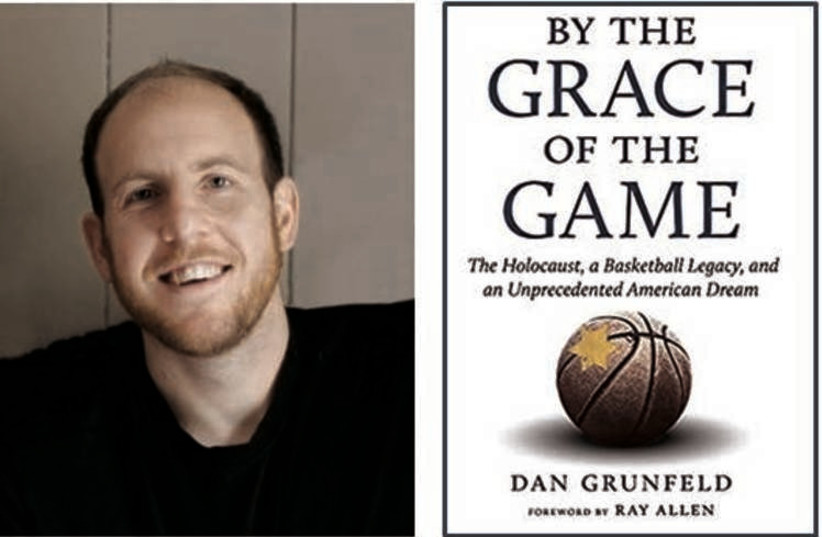Holocaust, basketball: The burden of Dan Grunfeld - review

Dan’s life and career became much more challenging than he ever could have imagined because of his family, but he embraced them and helped motivate him.
By all accounts, Dan Grunfeld is a young man with a very bright future ahead of him. Born in 1984 to a highly successful couple – his father a basketball star who parlayed his athletic success into a job as a top NBA executive, his mother the daughter of a founding partner of one of the largest law firms in Wisconsin – his future looked quite rosy. Add that Dan is highly intelligent, an extremely talented writer, a hard worker and an individual with empathy and the right sensitivities regarding life and its various challenges, his journey into adulthood should have been a case of smooth sailing from childhood all the way to the present. A book about his life, however, would most probably have been incredibly boring and not worth the read.
Yet Dan’s life and career became much more challenging than he ever could have imagined, because of his family’s Jewish origin, the trials and tribulations and horrific losses of parents and siblings experienced by his Hungarian Holocaust survivor grandparents, and the unique basketball career in America of his father, Ernie, who achieved incredible success on and off the court, following his immigration from Communist Romania to the US at age nine.
Rather than purposely ignoring or conveniently forgetting these painful aspects of his family history, Dan embraced them all, and they became highly significant factors that motivated him to try and emulate his father’s athletic achievements, even though his natural athletic abilities did not measure up to those of his dad. It also made him determined to share his grandparents’ Holocaust and postwar travails in great detail to highlight their incredible resilience and fortitude. To the best of my knowledge, this is the first book about American college and pro basketball, whose real heroes are an elderly couple of Holocaust survivors.
The family story
The story of the Grunfeld family begins in the village of Micula, in rural Transylvania, then part of Romania, on the border with Hungary. “There was natural beauty, but no running water, electricity or cars,” Dan describes. “Toilets were holes in the ground with makeshift wooden seats.”
Anyu, Dan’s grandmother, was one of 10 children, five boys and five girls. The family was Modern Orthodox and relatively well-off, and appeared to be living an almost idyllic, if technologically primitive, life.
The problems began in 1940 when Northern Transylvania was transferred from Romania to Hungary, in the framework of the Second Vienna Award, also known as the Vienna Diktat.
Within a year, the Hungarians began drafting Jewish males of military age to serve in the labor battalions, many of which were sent to accompany the Hungarian soldiers serving on the Eastern front. Their conditions were absolutely terrible, and Anyu’s oldest brother, Ernie, was purposely poisoned to death by a sadistic antisemitic commander in a labor camp in Ukraine.
These problems paled, however, to the horrific situation following the Nazi invasion of Hungary on March 19, 1944. Within two months, the Nazis began rounding up all the Jews living outside Budapest, and deporting them to be murdered in Auschwitz. In Dan’s detailed description of Anyu’s survival in the Hungarian capital, his grandmother showed incredible resourcefulness, not only in saving herself and her sisters but also assisting other Jews by obtaining for them the Schutz-Passe documents issued by Swedish diplomat Raul Wallenberg, which spared their bearers from deportation.
After the Russians liberated Budapest, Anyu headed home with one of her siblings, only to realize that most of her family had been murdered and almost every single one of their possessions had been robbed by their non-Jewish neighbors. She married a fellow survivor and tried to rebuild her life, but they realized that Communist Romania was not an ideal place to raise a Jewish family, and so after about a decade they were able to emigrate to the United States and start all over again in Forest Hills, Queens.
There, the same values of hard work and resourcefulness served them well, and even the tragic loss of one of their two sons to leukemia did not break their spirits. It was in New York City that their son Ernie achieved the American dream, starring in basketball at Forest Hills High, a success he replicated at the University of Tennessee, which paved the way for his NBA career on and off the court, and set Dan on his path to try and match his father’s successes.
A noble quest
As someone who grew up playing hoops in New York City fantasizing about achieving basketball history as the first Orthodox Jew to play in the NBA – despite totally lacking the skills required – I very much identified with Dan Grunfeld’s quest to duplicate his father’s basketball career.
His quest was noble, albeit somewhat obsessive, but he did make it to the pros, at least in Europe. But as Dan himself will admit, and as the readers of his book will learn, basketball is not the most important thing in life. That he was able to beautifully convey his family history and remain loyal to his Jewish heritage is the most valuable lesson from his journey. ■
The writer is the chief Nazi hunter of the Simon Wiesenthal Center and Director of its Israel Office and Eastern European Affairs.
By the Grace of the Game: The Holocaust, a Basketball Legacy, and an Unprecedented American DreamDan GrunfeldTriumph Books, 2021288 pages, $28 (Hardcover)
Jerusalem Post Store
`; document.getElementById("linkPremium").innerHTML = cont; var divWithLink = document.getElementById("premium-link"); if (divWithLink !== null && divWithLink !== 'undefined') { divWithLink.style.border = "solid 1px #cb0f3e"; divWithLink.style.textAlign = "center"; divWithLink.style.marginBottom = "15px"; divWithLink.style.marginTop = "15px"; divWithLink.style.width = "100%"; divWithLink.style.backgroundColor = "#122952"; divWithLink.style.color = "#ffffff"; divWithLink.style.lineHeight = "1.5"; } } (function (v, i) { });

